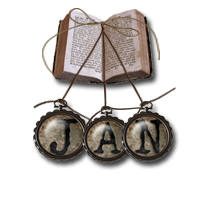Feature Book of the Week
The Screaming Staircase
by
Jonathan Stroud
A sinister Problem has occurred in London: all nature of ghosts, haunts,
spirits, and specters are appearing throughout the city, and they
aren't exactly friendly. Only young people have the psychic abilities
required to see-and eradicate-these supernatural foes. Many different
Psychic Detection Agencies have cropped up to handle the dangerous work,
and they are in fierce competition for business.
In The Screaming Staircase,
the plucky and talented Lucy Carlyle teams up with Anthony Lockwood,
the charismatic leader of Lockwood & Co, a small agency that runs
independent of any adult supervision. After an assignment leads to both a
grisly discovery and a disastrous end, Lucy, Anthony, and their
sarcastic colleague, George, are forced to take part in the perilous
investigation of Combe Carey Hall, one of the most haunted houses in
England. Will Lockwood & Co. survive the Hall's legendary Screaming
Staircase and Red Room to see another day?
A GUEST POST FROM JONATHAN STROUD
-->
Reading Makes You Fly
Two snapshots of
my childhood. In the first, a small boy, six years old, is curled in an
armchair on a Sunday afternoon. Sunshine drifts through the window, along with
the sounds of neighbours mowing their lawns. Occasionally the boy’s dangling
foot moves, twitching like the tail of a cat. Otherwise he is motionless. He’s
reading a book – a proper full-length one, without pictures. It’s the first
time he’s ever achieved this feat, and he’s mesmerised by his own new skill. He
won’t get up until the story is done.
The second snapshot. The same
small boy, a couple of years down the line. He’s in hospital now, has been for
a month. Pneumonia, which the doctors are finding hard to shift. He can’t walk
far, so he mostly stays in bed. But he’s a great traveller nonetheless. Piles
of books and comics lie around him – tales of adventure, magic and exotic
lands. He sits and he reads, and leaves his illness far behind. Books save him.
They carry him away.
Reading is power. It allows
you to escape your limitations – physical (as in my case), or social, or
whatever they may be. It gives you the ability to master the world. Without
reading, you’re stuck in the here and now. With it, possibilities are
everywhere around you: each newspaper, novel, comic or magazine becomes a door
to be walked through, a new universe to explore.
There’s no greater gift to
give a child.
But reading for pleasure’s a
weird thing. It’s not exactly work,
but you do need discipline to master
it. It’s not play either, though it
gives you endless delight. It’s an occupation that can’t really be taught or
enforced: kids have to discover the magic for themselves. Still, adults can –
and must – encourage them. The best thing is to lead by example. Be seen
reading. Read to the kid. Visit libraries. Above all, leave lots of books and
comics lying around – and allow them time and space to take advantage. No one forced me to sit in that armchair and
read my first novel (it was Enid Blyton’s Five
on a Treasure Island, by the way). I just thought I’d give it a go. And the
impulse changed my life. I’ve never forgotten it.
So how do you sum up the joy
of reading for those who don’t know? There’s an old photograph by the French
artist, Yves Klein. It’s called ‘Leap into the Void’. (Google it – it’s great.)
A man in a suit jumps from the roof of a building, over a quiet street. Is he
going to fall? Or is he – maybe, just maybe – about to defy gravity and soar
off into the heavens? The next split second will tell. Meanwhile a bloke on a
bike is passing below, entirely unaware that something miraculous is happening
above.
Reading
is like that. It’s a glorious leap into the void. It’s a feat of extraordinary
agility, which goes unnoticed by everyone around you. When you open any book
for the first time, you’re preparing to jump. When you begin to read, you’re
stepping off the edge. At that moment everything’s possible. You can go
anywhere, learn anything, become anyone…
Reading makes you fly.
ABOUT THE AUTHOR
I was born in Bedford, England, on 27th October
1970. When I was six my family moved to St Albans, near London, which is
where I grew up. From very early on I enjoyed scribbling stories and
drawing, and for a long time the two sides were equally balanced:
pictures interested me as much as words. Between the ages of seven and
nine I was often ill, and spent long periods in hospital and at home in
bed. During this time I escaped from boredom and frustration by reading
furiously: books littered my bedroom floor like bones in a lion's cave. I
tended to enjoy stories of magical adventure more than ones about real
life – I think this was because they provided a more complete escape.
Around this time I fell in love with fantasy.
Throughout my school years I experimented with different kinds of writing, often illustrated. I tried comics, gamebooks, board games, and later
poems and plays. Without being entirely aware of it, I was searching for
the kind of writing that suited me best. Meanwhile, I was getting more
and more interested in other people's writing. Finally I went to York
University, to read English Literature.
Like many English graduates, I left
university without a clue what to do. But I got an editorial job at
Walker Books, in London, and began to learn about children's books. For
several years I worked as an editor: helping authors with their ideas
and their texts, consulting with designers and artists about the visual
side, helping to create books of many kinds. I worked on encyclopaedias,
history books, game books and even a children's Bible. This taught me a
lot of things about structure, pace and style; meanwhile, in my free
time, I was busy writing also. I did several puzzle books for Walker,
and began working on a novel too. When Buried Fire was published in
1999, I knew that I had found what I truly wanted to do, but it took
until 2001 before I finally took the plunge, gave up being an editor and
tried to write full time.
The same year I married Gina, and we have a
daughter called Isabelle and a son called Arthur. Most days I go up to
my study,
and shut myself away from the world while I write. But I also enjoy
doing as many events and author visits as possible: it's essential that a
writer reminds himself of who he's writing for . . .
For more information about Jonathan Stroud and his book check out his website.























